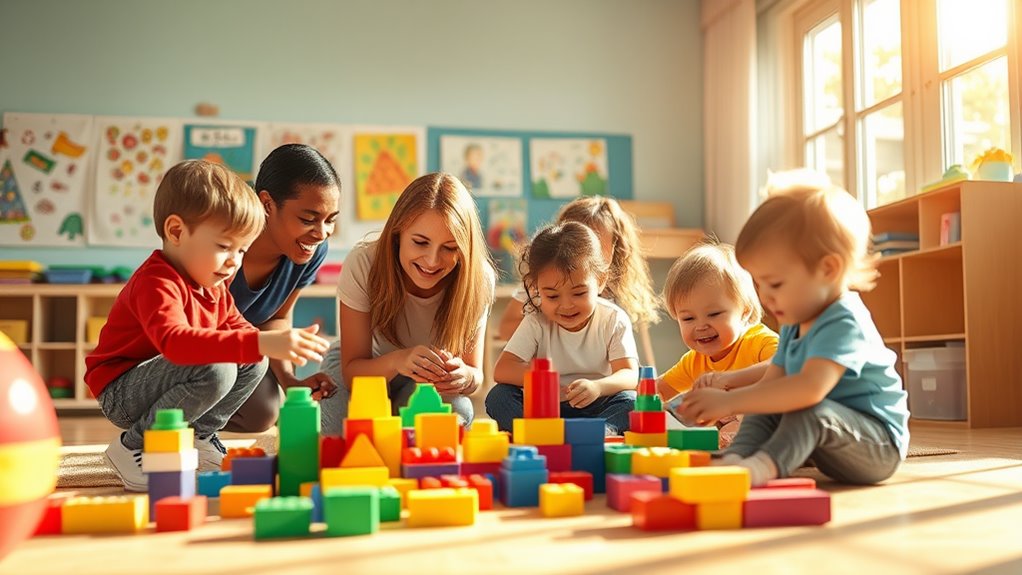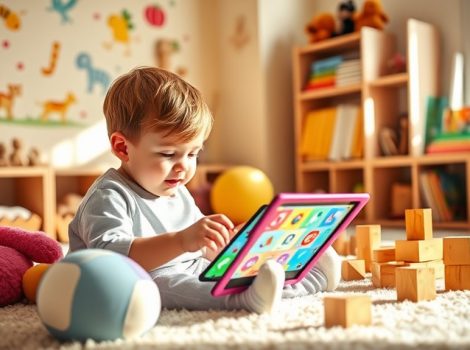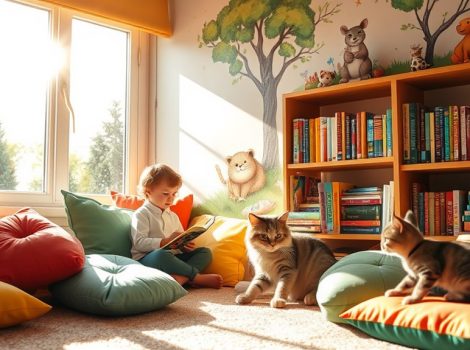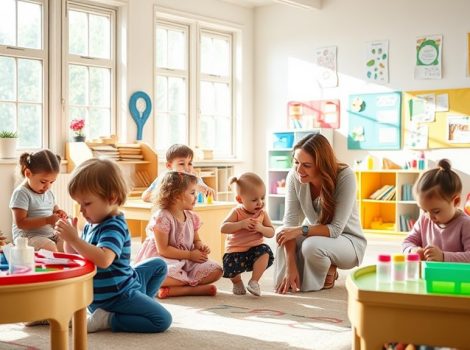The Hidden Benefits of Early Childhood Education You’ve Overlooked!
Early childhood education offers hidden benefits you might not have considered. It’s not just about academics; it fosters emotional development, helping your child build resilience and empathy through structured activities and collaborative play. You’ll see improved social skills as they learn to communicate effectively and resolve conflicts. This solid foundation boosts their long-term academic success and sparks creativity and critical thinking. Plus, it strengthens your relationship, encouraging open communication and trust. These advantages create well-rounded children who adapt easily to change and thrive in various environments. Explore these benefits further to discover how they can shape your child’s future!
Key Takeaways
- Early childhood education fosters emotional resilience, helping children develop impulse control and reflective thinking skills.
- Structured learning environments enhance social skills, promoting effective communication and the ability to resolve conflicts constructively.
- A strong foundation in early education correlates with long-term academic success and a lifelong love for learning.
- Engaging in imaginative play nurtures creativity and critical thinking, encouraging children to adapt and solve problems collaboratively.
- Active parent-child engagement during early education strengthens relationships, building trust and enhancing emotional intelligence for future interactions.
Enhanced Emotional Development
Early childhood education plays a crucial role in enhancing emotional development in young children. By engaging in structured activities and guided interactions, you help kids cultivate essential self-regulation skills. These skills enable them to manage their emotions, respond appropriately to challenges, and navigate social situations more effectively. When children learn to pause, reflect, and control their impulses, they build a foundation for emotional resilience that lasts a lifetime.
In addition, early childhood education nurtures empathy development. Through collaborative play and storytelling, kids learn to recognize and understand the feelings of others. As they practice sharing, cooperating, and resolving conflicts, they become more attuned to the emotional landscapes around them. This not only enriches their relationships but also fosters a sense of community and belonging.
Improved Social Skills
Fostering social skills in early childhood education is essential for helping children build meaningful connections with their peers. When kids engage in peer interaction, they learn to communicate effectively, share their thoughts, and express their feelings. These experiences shape their understanding of social dynamics and prepare them for future relationships.
Here are some key benefits of improved social skills through early childhood education:
- Enhanced Communication: Children learn to articulate their needs and feelings.
- Increased Empathy: Kids develop the ability to understand and share the emotions of others.
- Conflict Resolution Skills: They learn how to resolve disagreements in a constructive manner.
- Teamwork: Working together on projects fosters collaboration and trust.
- Building Friendships: Positive social experiences lead to lasting friendships.
Long-Term Academic Success
Achieving long-term academic success starts with laying a solid foundation in early childhood education. When you invest in quality early learning experiences, you’re not just nurturing your child’s immediate cognitive skills; you’re setting them up for a lifetime of academic motivation and achievement. Research shows that children who engage in structured educational environments develop critical thinking and problem-solving abilities that translate into higher performance in later grades.
By fostering curiosity and a love for learning early on, you help your child build intrinsic motivation. This motivation is crucial as they encounter more complex subjects in school. A strong grasp of foundational concepts—like literacy and numeracy—enables them to tackle advanced topics with confidence.
Moreover, early childhood education cultivates social and emotional skills that complement cognitive development. When children learn to collaborate and communicate effectively, they’re more likely to participate actively in their education, further enhancing their academic journey.
Ultimately, by prioritizing early childhood education, you’re not just preparing your child for school; you’re equipping them with the tools they need to flourish academically throughout their lives. The benefits you provide now will echo in their future successes.
Increased Creativity and Critical Thinking
When children engage in imaginative play and hands-on activities during their early education, they unlock pathways to greater creativity and critical thinking. This foundation not only nurtures their innate curiosity but also equips them with essential skills for life. As you witness your child’s imagination flourish, you’ll see how they begin to approach challenges with a mindset geared toward creative problem solving.
Consider these benefits of fostering creativity and critical thinking through early education:
- Enhanced problem-solving skills: Kids learn to think outside the box.
- Improved communication: Imaginative play encourages sharing ideas and expressing thoughts.
- Increased adaptability: Children become more flexible in their thinking.
- Deeper engagement: Active learning keeps kids invested and interested.
- Stronger collaboration: Group activities promote teamwork and respect for differing ideas.
Stronger Parent-Child Relationships
Building strong parent-child relationships is vital during early childhood education, as it lays the groundwork for a child’s social and emotional development. When you engage actively in your child’s learning, you’re not just enhancing their educational experience; you’re also nurturing a bond that fosters trust and open communication.
Strong communication skills are essential in this process. By discussing their day, sharing thoughts, and encouraging your child to express their feelings, you create an environment where they feel safe and valued. This open dialogue helps your child develop emotional intelligence—an important skill for navigating both personal and social situations later in life.
Moreover, trust building is key. When your child knows they can rely on you for support and guidance, their confidence flourishes. This trust enables them to explore their world, knowing you’re their safety net.
In essence, investing in your relationship with your child during these formative years pays dividends. You’re not only shaping their educational journey but also fostering a strong foundation for their future relationships and interactions. Embrace this opportunity, and watch as both you and your child grow together.
Better Adaptability to Change
Early childhood education equips children with essential skills for better adaptability to change, a crucial ability in our ever-evolving world. By fostering an environment that encourages exploration and creativity, you help your child develop flexible thinking. This skill enables them to approach problems from multiple angles and find innovative solutions.
Here are some key benefits of enhancing adaptability through early education:
- Encourages problem-solving: Children learn to tackle challenges independently.
- Boosts confidence: They become more self-assured in their ability to handle new situations.
- Promotes resilience building: Kids learn to bounce back from setbacks and view failures as opportunities for growth.
- Enhances social skills: Adapting to different environments helps them interact effectively with diverse groups.
- Fosters a love for learning: With a flexible mindset, children become lifelong learners, eager to embrace change.
Frequently Asked Questions
What Age Is Best to Start Early Childhood Education?
The best age to start early childhood education is around three years old. At this stage, kids show preschool readiness and can achieve crucial developmental milestones, helping them thrive academically and socially as they grow.
How Does Early Education Impact Future Career Choices?
Early education shapes your career aspirations by fostering essential skill development. It builds confidence, creativity, and critical thinking, equipping you with tools to navigate various paths and make informed choices as you pursue your future goals.
Are There Benefits to Late Enrollment in Early Childhood Programs?
Late enrollment in early childhood programs can offer potential advantages. You might find that kids develop strong social skills and increased developmental readiness, allowing them to thrive despite starting later than their peers.
How Can Parents Support Learning at Home?
To support learning at home, you can create interactive activities that stimulate curiosity and establish consistent reading routines. These practices nurture your child’s development, fostering a love for learning and enhancing their educational journey.
What Types of Early Education Programs Are Most Effective?
Think of early education as a garden; Montessori methods nurture independence while play-based learning cultivates creativity. Both approaches effectively blossom children’s skills, ensuring they thrive academically and socially throughout their formative years.




